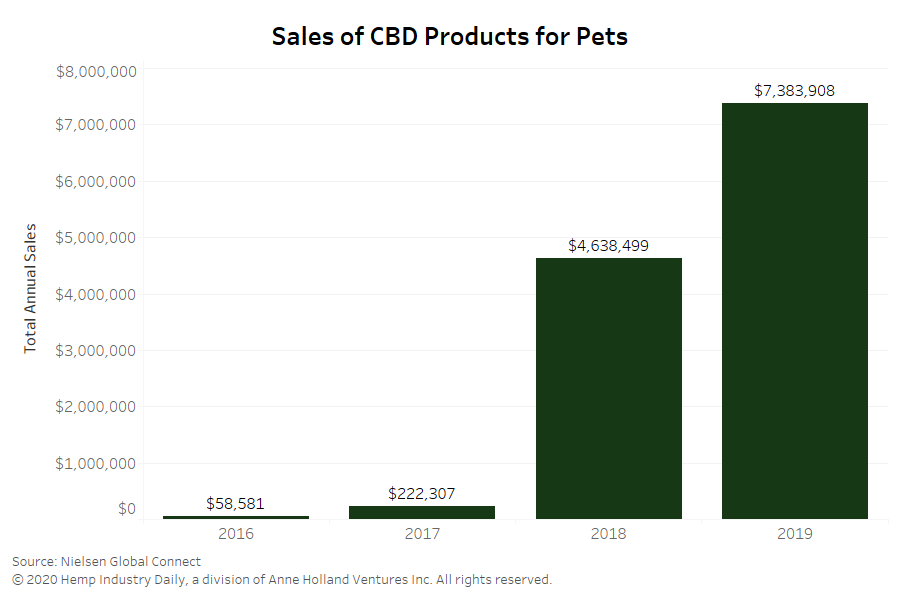In just two years, the number of specialty pet stores that carried Colorado-based Functional Remedies’ CBD products increased dramatically, going from 100 to 500 – underscoring the fast growth of a market that’s now reaching mass-market retailers like Petco and PetSmart.
“More and more people are understanding how CBD and how hemp-based products can enhance wellness, not only humans but in pets,” said Tim Gordon, chief science officer at Functional Remedies, headquartered in Boulder.
Functional Remedies is just one example of a market seeing tremendous growth.
In 2016, sales for pet CBD products stood at $58,581 – but that increased to nearly $7.4 million in 2019, said Maria Lange, pet and cannabis research specialist for market analytics giant Nielsen Global Connect.
Over the last year, 57% of pet specialty stores were selling CBD products, up from 45% the prior year, Lange said.
The growth comes even as the U.S. Food and Drug Administration – which oversees pet foods and drugs, as well as those for human consumption – has yet to authorize CBD for pets. The FDA’s 2019 review of CBD products included those for pets, though results of the review are still pending.
“Though the anticipation and excitement is there for many chain retailers, full acceptance has not yet occurred as retailers continue to be in a bit of limbo as the result of a lack of FDA guidance on CBD products,” she said.
“As pet parents continue to seek out new ways to care for the overall health and wellness of their pets, the demand for trusted products with naturally occurring CBD for pets has also continued to grow,” Petco said in a statement.
Then in mid-May, competitor PetSmart began selling hemp extract products from Denver-based Mary’s Tails, saying in a news release that the company’s line will be sold at 122 stores in Colorado, Oregon, Indiana, Kentucky and Tennessee – with plans to expand this summer.
Growth trajectory
A December 2019 Nielsen study found pet owners are looking to CBD to help their four-legged companions with:
- Back and joint pain.
- Episodic and chronic anxiety.
- Stress.
- Arthritis.
- General health and wellness.
Luke Mullins, vice president of sales at Mary’s Tails, told Hemp Industry Daily that the company is in 1,000 retailers nationally, with plans to double that by year’s end.
Mullins notes that Mary’s Tails is careful about how they describe their products to avoid the warning letters the FDA has sent to “unscrupulous operators” that make claims that are not scientifically proven.
“We believe that our tagline – keeping your pets happy, healthy and calm – is a great summation of our products’ benefits,” Mullins said, adding that that they are mindful of the parameters federal agencies have set.
“So while we believe in the value and efficacy of all of our products, we are not permitted to speak to those concepts,” he said.
Education is key
Despite the increase, there’s still a lack of knowledge from consumers about CBD for their pets and how to use it properly, Lange said.
“A lot of people don’t know that pets and humans or dogs and humans share the same endocannabinoid system,” she said. “I think a lot of people think of CBD as cannabis, thinking probably it could make their dog high.”
Gordon, from Functional Remedies, said veterinary clinics have been instrumental about educating the public.
“I think that is really where we’re seeing a turn from,” he said. “Yes, you can go buy them in retail, but you can also go buy them now from a trusted source, and that being your veterinarian who also wants these products on the shelf as well.”
In fact, Nielsen surveyed 100 veterinarians in April and found that they have a greater awareness than physicians about CBD, “at an incidence double that of physicians,” Lange said.
The FDA hasn’t given veterinarians the go-ahead to sell CBD, but it appears some are doing it anyway, although it’s unclear how many.
Gordon said he uses CBD on his own pets.
“I want to give them the ultimate care, just like my own children,” he said.
Ivan Moreno can be reached at [email protected]


